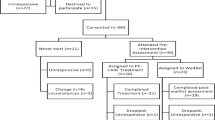Abstract
The effectiveness of the Incredible Years Parenting Program was evaluated in a low-income sample of Caucasian, African American, Hispanic, and Asian mothers whose children were enrolled in Head Start. Data from two prior intervention studies [Webster-Stratton (1998) Journal of Consulting and Clinical Psychology, 66(5), 715–730; Webster-Stratton et al. (in press) Journal of Clinical Child Psychology] were combined, yielding a sample of 634 families (370 Caucasian, 120 African American, 73 Asian, 71 Hispanic) across 23 Head Start centers. Centers were matched and assigned randomly to either an experimental condition (8–12 weeks of weekly 2-hr parenting classes), or a control condition (the regular Head Start Program without parenting groups). Families in both conditions were assessed using home observations of parent–child interactions and parent reports of parenting style and discipline strategies and child behavior problems in the fall (baseline) and spring (postintervention) of the children's Head Start year. Families were reassessed 1 year later. Following treatment, intervention mothers were observed to be more positive, less critical, more consistent, and more competent in their parenting than were control mothers. Additionally, children of intervention parents were observed to exhibit fewer behavior problems than were control children. Differences in treatment response across ethnic groups were few, and did not exceed the number expected by chance. Parents from all groups reported high satisfaction levels following the parenting program. Results indicate that the Incredible Years Program is accepted by and effective with diverse populations.
Similar content being viewed by others
REFERENCES
Achenbach, T. M. (1991). Manual for the Child Behavior Checklist/ 4–18 and 1991 Profile. Burlington, VT: University of Vermont, Department of Psychiatry.
Berger, A. M., Knutson, J. F., Mehm, J. G., & Perkins, K. A. (1988). The self-report of punitive childhood experiences of young adults and adolescents. Child Abuse and Neglect, 12, 251–262.
Botvin, G. J. (1995). Drug abuse prevention in school settings. Thousand Oaks, CA: Sage.
Botvin, G. J., Schinke, S., Epstein, J. A., & Diaz, T. (1994). Effectiveness of culturally focused and generic skills training approaches to alcohol and drug abuse prevention among minority youths. Psychology of Addictive Behaviors, 8(2), 166–127.
Botvin, G. J., Schinke, S., Epstein, J. A., Diaz, T., & Botvin, E. M. (1995). Effectiveness of culturally focused and generic skills training approaches to alcohol and drug abuse prevention among minority adolescents: Two-year follow-up results. Psychology of Addictive Behaviors, 9(3), 183–194.
Brestan, E. V., & Eyberg, S. M. (1998). Effective psychosocial treatments of conduct-disordered children and adolescents: 29 years, 82 studies, and 5,272 kids. Journal of Clinical Child Psychology, 27(2), 180–189.
Bryk, A. S., & Raudenbush, S.W. (1992). Hierarchical linear models: Applications and data analysis methods. Newbury Park, CA: Sage.
Chambless, D. L., & Hollon, S.D. (1998). Defining empirically supported therapies. Journal of Consulting and Clinical Psychology, 66(1), 7–18.
Dent, C. W., Sussman, S., Ellickson, P., Brown, P., & Richardson, J. (1996). Is current drug abuse prevention programing generalizable across ethnic groups. American Behavioral Scientist, 39(7), 911–918.
Dumas, J. E., & Wahler, R. G. (1983). Predictors of treatment outcome in parent training: Mother insularity and socioeconomic disadvantage. Behavioral Assessment, 5(4), 301–313.
Ellickson, P. L., & Bell, R. M. (1990). Drug prevention in junior high: A multi-site longitudinal test. Science, 247, 1299–1305.
Eyberg, S. M., & Johnson, S. M. (1974). Multiple assessment of behavior modification with families: Effects of contingency contracting and order of treated problems. Journal of Consulting and Clinical Psychology, 42(4), 594–606.
Forehand, R., & Kotchick, B. A. (1996). Cultural diversity:Awakeup call for parent training. Behavior Therapy, 27, 187–206.
Graham, J.W., Johnson, C. A., Hansen, W.B., Flay, B. R., & Gee, M. (1990). Drug use prevention programs, gender, and ethnicity: Evaluation of three seventh-grade Project SMART cohorts. Prevention Medicine, 19, 305–313.
Gross, D., Louis, F., Webster-Stratton, C., & Grady, J. (1999). Parent training with low-income multi-ethnic parents of toddlers. Paper presented at the Society for Prevention Research, Albuquerque, NM.
Harachi, T. W., Catalano, R. F., & Hawkins, J. D. (1997). Effective recruitment for parenting programs within ethnic minority communities. Child and Adolescent Social Work Journal, 14(1), 23–39.
Hill, H. M., Soriano, F. I., Chen, S. A., & LaFromboise, T.D. (1994). Sociocultural factors in the etiology and prevention of violence among ethnic minority youth. In L. D. Eron, J. H. Gentry, & P. Schlegel (Eds.), Reason to hope: A psychosocial perspective on violence and youth (pp. 59–97). Washington, DC: American Psychological Association.
Kazdin, A. E. (1995). Child, parent, and family dysfunction as predictors of outcome in cognitive-behavioral treatment of antisocial children. Behaviour Research and Therapy, 33(3), 271–281.
Maiuro, R. D., Vitaliano, P. P., & Cohn, T. S. (1987). A brief measure for the assessment of anger and aggression. Journal of Interpersonal Violence, 2, 166–178.
Miller, L. S., Kamboukos, D., Klein, R., & Coard, S. (in press). Preventing conduct problems in urban, high-risk preschoolers through parent training: A pilot study.
Miller, L. S., & Rojas-Flores, L. (in press). Preventing conduct problems in urban, Latino preschoolers through parent training: A pilot study.
Patterson, G. R. (1982). Coercive family process. Eugene, OR: Castilia.
Patterson, G. R., Chamberlain, P., & Reid, J. B. (1982). A comparative evaluation of a parent training program. Behavior Therapy, 13, 638–650.
Patterson, G. R., Reid, J. B., & Dishion, T. J. (1992). A social interactional approach: Antisocial boys (Vol. 4). Eugene, OR: Castalia.
Radloff, L. (1977). The CES-D Scale:Aself-report depression scale for research in the general population. Journal of Psychological Measurement, 1, 385–401.
Raudenbush, S. W., Bryk, A. S., Cheong, Y. F., & Congdon, T. T. (2000). HLM?5: Hierarchical linear and nonlinear modeling. Lincolnwood, IL: Scientific Software International.
Reid, J. B., Eddy, J. M., Fetrow, R. A., & Stoolmiller, M. (1999). Descriptive and immediate impacts of a preventive intervention for conduct problems. American Journal of Community Psychology, 27, 483–517.
Reid, J., Taplin, P., & Loeber, R. (1981). A social interactional approach to the treatment of abusive families. In R. B. Stuart (Ed.), Violent behaviors: Social learning approaches to prediction, management, and treatment (pp. 83–101). New York: Brunner/Mazel.
Robinson, E. A., & Eyberg, S. M. (1981). The dyadic parent–child interaction coding system: Standardization and validation. Journal of Consulting and Clinical Psychology, 49, 245–250.
Robinson, E. A., Eyberg, S. M., & Ross, A.W. (1980). The standardization of an inventory of child conduct problem behaviors. Journal of Clinical Child Psychology, 9, 22–28.
Sanders, M. R. (1992). New directions in behavioral family intervention with children: From clinical management to prevention. New Zealand Journal of Psychology, 21, 25–36.
Spoth, R., & Cleve, R. (1995). Parent motivation to enroll in parenting skills programs: A model of family context and health belief predictors. Journal of Family Psychology, 9(3), 294–310.
Taylor, T. K., & Biglan, A. (1998). Behavioral family interventions for improving child-rearing: A review of the literature for clinicians and policy makers. Clinical Child and Family Psychology Review, 1(1), 41–59.
Taylor, T. K., Schmidt, F., Debra, P., & Christine, H. (1998). A comparison of eclectic treatment with Webster-Stratton's Parents and Children Series in a children's mental health center: A randomized controlled trial. Behavior Therapy, 29, 221–240.
Webster-Stratton, C. (1985a). Comparison of abusive and nonabusive families with conduct-disordered children. American Journal of Orthopsychiatry, 55, 59–69.
Webster-Stratton, C. (1985b). Comparisons of behavior transactions between conduct disordered children and their mothers in the clinic and at home. Journal of Abnormal Child Psychology, 13, 169–184.
Webster-Stratton, C. (1985c). Dyadic parent–child interactive coding system-revised (DPICS-R): Manual. Unpublished manual, University ofWashington.
Webster-Stratton, C. (1988). Mothers' and fathers' perceptions of child deviance: Roles of parent and child behaviors and parent adjustment. Journal of Consulting and Clinical Psychology, 56, 909–915.
Webster-Stratton, C. (1998). Preventing conduct problems in Head Start children: Strengthening parenting competencies. Journal of Consulting and Clinical Psychology, 66(5), 715–730.
Webster-Stratton, C., & Fjone, A. (1989). Interactions of mothers and fathers with conduct problem children: Comparison with a control group. Public Health Nursing, 6, 218–223.
Webster-Stratton, C., & Hammond, M. (1990). Predictors of treatment outcome in parent training for families with conduct problem children. Behavior Therapy, 21, 319–337.
Webster-Stratton, C., & Hammond, M. (1997). Treating children with early-onset conduct problems: A comparison of child and parent training interventions. Journal of Consulting and Clinical Psychology, 65(1), 93–109.
Webster-Stratton, C., & Hammond, M. (1998). Conduct problems and level of social competence in Head Start children: Prevalence, pervasiveness, and associated risk factors. Clinical Child and Family Psychology Review, 1(2), 101–124.
Webster-Stratton, C., Hollinsworth, T., & Kolpacoff, M. (1989). The long-term effectiveness and clinical significance of three cost-effective training programs for families with conduct-problem children. Journal of Consulting and Clinical Psychology, 57(4), 550–553.
Webster-Stratton, C., & LindsayWoolley, D. (1999). Social competence and conduct problems in young children: Issues in assessment. Journal of Clinical Child Psychology, 28(1), 25–43.
Webster-Stratton, C., Reid, M. J., & Hammond, M. (2001). Preventing conduct problems, promoting social competence: A parent and teacher training partnership in Head Start. Journal of Clinical Child Psychology, 30(3), 283–302.
Wood, W. D., & Baker, J. A. (1999). Preferences for parent education programs among low socioeconomic status, culturally diverse parents. Psychology in the Schools, 36(3), 239–247.
Author information
Authors and Affiliations
Rights and permissions
About this article
Cite this article
Reid, M.J., Webster-Stratton, C. & Beauchaine, T.P. Parent Training in Head Start: A Comparison of Program Response Among African American, Asian American, Caucasian, and Hispanic Mothers. Prev Sci 2, 209–227 (2001). https://doi.org/10.1023/A:1013618309070
Issue Date:
DOI: https://doi.org/10.1023/A:1013618309070




